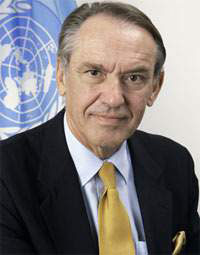Jan Eliasson, Deputy Secretary-General of the United Nations.
Report by Jonathan Sclar

Jan Eliasson, Deputy Secretary-General of the United Nations
On Wednesday, October 8, 2014, the Political Science Department, the Collaboration Project, and the International Studies program hosted U.N. representative Jan Eliasson. Mr. Eliasson, a Swedish Naval Academy graduate with his master’s degree in economics and business administration, administered a speech on the current state of the world. He has served as Diplomatic Advisor to the Swedish Prime Minister and as Director General for Political Affairs in the Swedish Ministry of Foreign Affairs. He is currently the Deputy Secretary General of the United Nations. Students, professors, and faculty from various areas of study had the opportunity to engage with one of the world’s major players in a question-answer format discussing domestic and international issues that affect all of us alike. The European Union, the role of women, and his analysis of social media were three things that stood out in his speech.
The European Union is unique with regards to its integration of numerous countries throughout the world. There are 28 countries in total and all of them reap the benefits of belonging to such an important political and economic union. All member-states have to abide by the standards that the E.U. wishes to uphold. However, they also enjoy free trade and the ability to boost their economy in a supportive political environment. In addition, the E.U. is a strong supporter of and believer in human rights and due process of law. Therefore, individuals who are citizens of member-states enjoy freedoms that they may otherwise not receive. As Mr. Eliasson said, the E.U. represents the nations’ “desire for peace,” and represents Mr. Eliasson’s world view on international relations. He believes in a system that allows us to all be interconnected and interdependent, because in that reliance on each other we become bigger proponents for peace and harmony. The “they-we dichotomy” is not a proper way to successfully govern the international community; this ideology begets conflict because the interests of certain states become more important than the interests of the world as a whole. This imbalance results in the most powerful states forcing their interests onto the international stage. To reduce or manage conflict to the best of our ability it is essential that we learn to think in the group mentality when discussing the international community. The European Union is a perfect example of this because it attempts to put 28 states into one body that is representative of all of them. These states must work together in order to create the maximum quality of life for all of its citizens.
Secondly, Mr. Eliasson emphasized the importance of women for the world’s future. Women are still facing an uphill battle, on an international level, in their fight for equality of rights. It is important for leaders around the world to support them in obtaining the rights that they deserve. Furthermore, it is important to recognize the emerging female leaders around the world. For example, politicians in the United States such as Hilary Clinton, Elizabeth Warren, and Kirsten Gillibrand all have large-scope political aspirations. Also, Brazil’s presidential election features two females as the primary candidates. Women are emerging as prime political and social candidates and it is important to support them on both a domestic and international level.
Lastly, Mr. Eliasson’s comments on social media were eye-opening. It is often easy to point towards social media, in terms of a scape goat, when discussing the de-socialization of our youth. However, social media does not get enough credit for its influence on national and international politics. When Political Science major Varun Gandhi posed a question asking about the effects social media has on the international community and non-state actors, Mr. Eliasson suggested that social media has completely transformed international relations; politicians world wide are now held accountable for their actions on a broad scale because of the transparency of political action that social media provides us with. The time has passed in which a corrupt act can occur and be hidden.
Mr. Eliasson brought an important and strong message to Adelphi University. Speaking to the state’s youth, he spoke about the importance of community cohesion in managing conflicts. The transparency of the world is changing politics for the better, insofar as politicians and world leaders are held to a high level of accountability. We must embrace women as the future leaders as they will play an important role in the future of the world. Overall, Mr. Eliasson’s visit to Adelphi University was a success as attendees had the opportunity to learn more about the state of the world from a one-of-a-kind expert.
For further information, please contact:
Todd Wilson
Strategic Communications Director
p – 516.237.8634
e – twilson@adelphi.edu